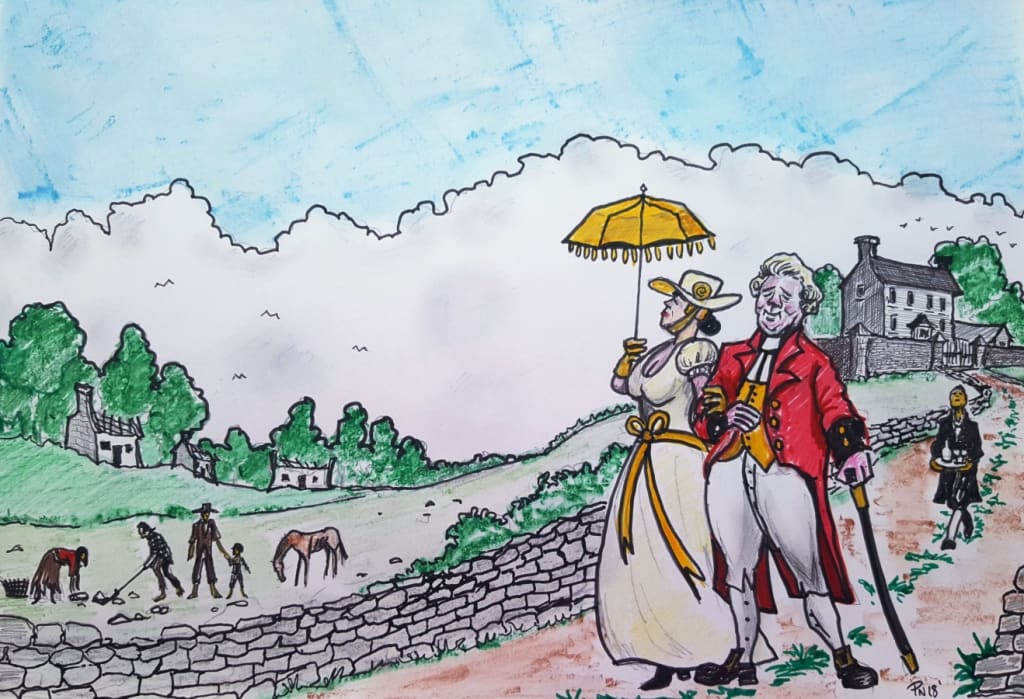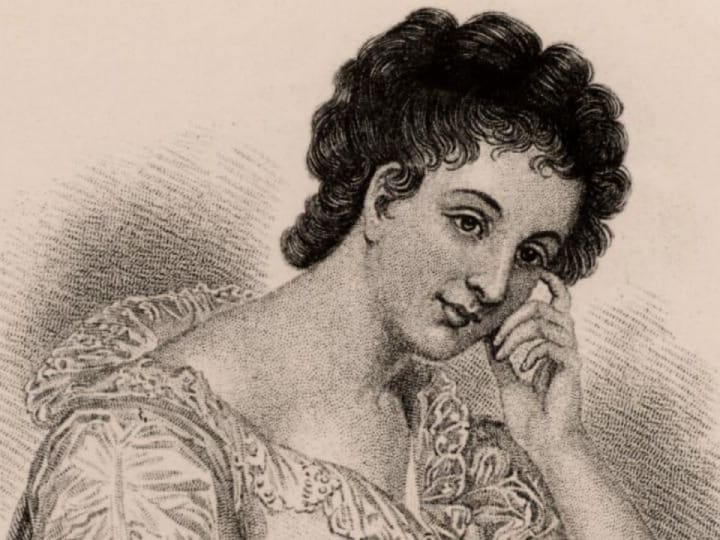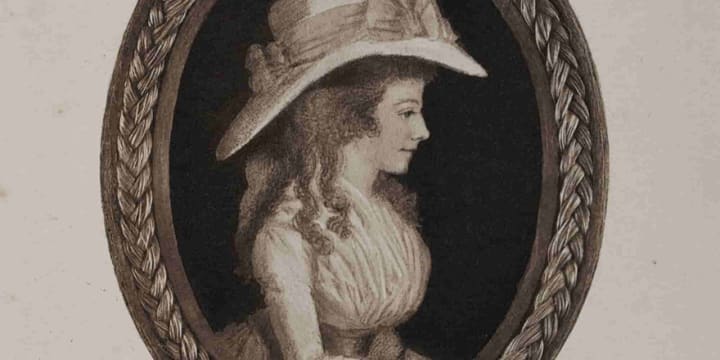"Castle Rackrent" by Maria Edgeworth
First Impressions (Pt.12)

Within this text, a number of striking personalities can be seen. First and foremost we have the personality of the first generation guided by Sir Patrick, a man of little means and of normally few words apart from a more godly and patriarchal view in a William Faulkner fashion. Sir Patrick is declared a ‘spend-thrift’ and is often the most concerned about the view of others upon himself as a moral human being towards them. A Machiavellian trait, this is thought to have continued in the lineage of the family. Sir Murtagh is the second generation and he is described as a ‘fiend’ and often a ‘litigating fiend’. Here we see the morality of the family descend ever so slightly and so, the reader is given insight into the decline and fall of this rather extensively proud and historical family of old, Irish faith. Within the third generation the reader meets Sir Kit - a deplorable human being, a gambler, a spender and an abusive husband to his wife. Here the reader can clearly see a massive decline from what was the historical past of Sir Patrick in which the spend-thrift culture was clearly visible to all. Sir Kit seems to be overtly concerned about himself and does not care what others think of him. This is most likely a delusion of grandeur since he has come from a family that is both respected and historical and, as he is the third generation, must feel as if he is entitled to respect and is automatically virtuous for his purity of family. Finally we have the furthest generation away from the firast which is the fourth generation of Sir Condy. Sir Condy is a man that is often considered the morally better of the four, the more likeable of them all and yet, the most susceptible to suggestion out of them all. He is constantly manipulated and duped, turned and twisted. His naivety is his downfall and therefore, he too has similar faults to his predecessors - that he cannot see something approaching right in front of him and that he has very little self-control. But in the way that the older generations have no self-control because of various needs such as: saving money, fiendishness and machiavellianism, gambling addiction and spending money relentlessly - Sir Condy has no self-control because of the way in which other characters tend to want to control or overpower him.
Apart from all of this, the only real character the reader is actually completely aware of, knows personally and feels connected to is actually none of these four generational characters - but instead, it is the narrator, a side-line character called Thady. This is a character that often covers his own dialogue and thoughts within the narrative, concealing his own bias and belief systems of Irish Catholicism between the lines of the actual overall plot. Ultimately, the reader does not actually get to know the four generations that they initially came for, but instead the reader learns a lot about the way in which stories of others can be told by anybody, no matter how remote, distant or close they are.

The opinion of Thady is very important to how the reader envisions the characters. For example, when the reader is being told about the spend-thrift Sir Patrick there is an obvious darkness to his character that is overshadowed by this strong, patriarchal personality of a man who, in most cases, is known across the land as a figurehead and more like a man to be feared than loved. Powerful as he is, the only actual opinion that the reader encounters of him is of Thady and upon Sir Patrick’s death, there is something Thady states that makes the reader somewhat conflicted about the actual state of his character. But more so, it makes the reader conflicted about the reliability of Thady’s narrative as it is filled with personal opinion:
“Never did any gentleman live and die more beloved in the country by rich and poor - his funeral was such a one as was never known before nor since in the country. All the gentlemen in the three countries were at it - far and near, how they flocked! - my great-grandfather said that to see all the women even in their red cloaks, you would have taken them for the army drawn out…” (p.11)
Now, the reporting of Thady’s great-grandfather’s speech is also done by Thady and so, it is easy to result to believing entirely in this reported quotation. However, the conflicting character attitudes the reader encounters from the narrative cause question in the mind of spectators upon the text as to whether they should entirely trust the words of one human being who, in all aspects, was on not only the outside of the situation, but in some cases had never actually encountered the human being at hand for themselves.
Thady’s comments about Sir Murtagh are often favourable, except where he describes him as almost fiendish. The presentation of this conflicting viewpoint is one of the reasons that the reader witnesses a slow decline of the family rather than a quick one. This is because the narrator is purposefully trying to cover up the negative points of character, leaving room for the reader to contemplate the situation of good and bad. At the time in which Sir Murtagh is dying, there is a statement made by Thady in which he glances over the fiendishness and makes comments about power and powerfulness which seek to show Sir Murtagh in a better light and so, the reader will give certain sympathies because they can clearly see that this man is in pain and is about to die:
“But Sir Murtagh thought nothing of the Banshee, nor of his cough with a spitting of blood, brought on, I understand, by catching a cold in attending the courts, and overstraining his chest with making himself heard in one of his favourite causes. He was a great speaker with a powerful voice; but his last speech was not in the courts at all…” (p.17)
Thus, we see that this character who once was described as having some sort of money lust, a character who was though a learned man that was also a machiavellian one to many degrees and a man who was often more concerned by his power and personal image than doing the correct and moral thing as someone who is dying and can no longer do the one thing that they loved doing. The reader’s sympathy is therefore with the character, only in the way being manipulated by the narrator.
The brutality of Sir Kit is often overshadowed by his strange and lamentable death. For years it had seemed like he was psychologically abusive towards his wife, gambling his money away and often was a horrid human being. As a character, he was more violent, vicious and villainous that any of the four generations of character the reader encounters in the book, but at the time of his death, Thady almost turns this characterisation around by using a similar technique that he did for the previous two characters. This time, Thady seeks to pit the blame for death on someone else as sickness, he knows, would not be enough to make the reader believe that the death of the character in the circumstances of which he died was worse than the character himself:
“My master was greatly lamented - there was no life in him when we lifted him out of the barrow, so he was laid out immediately, and waked the same night. The country was all in an uproar about him, and not a soul but cried shame upon his murderer, who would’ve been hanged surely, if he could have been brought to trial whilst the gentlemen in this country were up about it, but he very prudently withdrew himself to the continent before the affair was make public…” (p.34)
Thus the reader can definitely see that in death, Sir Kit is made to look like this beloved human being who was murdered in cold blood and so this state of character, according to Thady, has nothing to do with the brute Sir Kit was whilst he was alive. It is a conflicting viewpoint in which the reader really gets nothing reliable but Thady’s statements on the situation.

When the reader encounters Sir Condy there is a massive change in the way the narration sets out and that is because Sir Condy does nothing intrinsically wrong. Instead, Sir Condy is often gullible and manipulated by Jason, Thady’s son. Thus we see how father and son can both manipulate the way of thinking, Thady manipulates the reader and Jason manipulates Sir Condy. Afterwards, Sir Condy loses everything of Rackrent and so, the reader assumes this is entirely the fault of his gullible and careless nature. However, if the reader were to look back, they can see a definite decline in the historical family’s income and money from the times of Sir Murtagh at least. Yet, there is only one thing that Thady states about this and it is filled with negative connotations in which Sir Condy is made out to be almost criminally ignorant:
“The execution came down and everything at Castle Rackrent was seized by the gripers, and my son Jason, to his shame be it spoken, amongst them…” (p.71)
An unusual statement that makes both Sir Condy and Jason look villainous in two different ways. Sir Condy is criminally unaware and Jason is manipulative, thieving and often lacking in empathy for Sir Condy. This seeks to show the reader that the family has really hit rock bottom in their financial and power-play situations.
Thady makes an interesting comment about truth and lies at the end of the novel which often leaves the reader in question about his true intentions throughout that are littered with personal opinion, bias and often with out right lies about the individual in comparison to their character:
“As for all I have here set down from memory and hearsay of the family, there’s nothing but truth in it from beginning to end, that you may depend upon, for where’s the use of telling lies about the things which everybody knows as well as I do?” (p.96)
To conclude, Thady admits that he may be lying but that is completely up to the reader to analyse and, when the reader looks closer at each and every character they will come to realise that they can actually believe nothing of what Thady says in the book due to his differing opinions and statements that rely completely on hearsay and rumour.
Citation:
Edgeworth, M (2008). Castle Rackrent . 2nd ed. UK: Oxford World's Classics.
About the Creator
Annie Kapur
200K+ Reads on Vocal.
English Lecturer
🎓Literature & Writing (B.A)
🎓Film & Writing (M.A)
🎓Secondary English Education (PgDipEd) (QTS)
📍Birmingham, UK






Comments
There are no comments for this story
Be the first to respond and start the conversation.